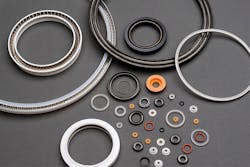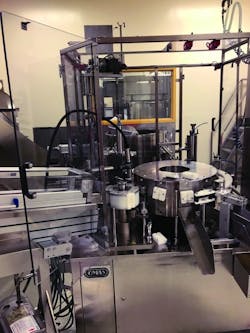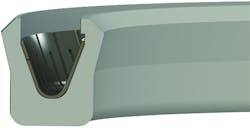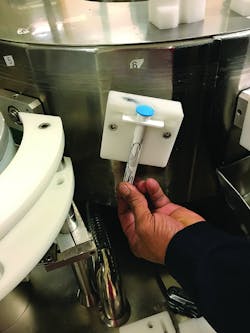Custom-machined pharmaceutical seals and plastics save time and money
Pharmaceutical liquid syringe filling and cartoning machines are composed of numerous plastic parts and sealing components that are constantly in motion and require continuous maintenance. To reduce the risk of costly, time-consuming interruptions, routine repairs and part replacements are planned as scheduled shutdowns. Nevertheless, unplanned events occur.
What options are available when a manufacturer needs to procure parts quickly?
Since many of the machines used for syringe filling and carton packaging are manufactured in Europe, rapid delivery of parts to geographically dispersed facilities can be logistically challenging. Two additional challenges also emerge.
Solution for multiple challenges
First, U.S. Food and Drug Administration (FDA)-compliant plastic parts, such as guide rails, turning pucks, turning holders for syringe filling, and seals designed for leakage control are specialty items with strict specifications. Facilities that produce water for injection (WFI) used in vaccines and purified water (PW) used for cleaning exterior items like bottles, tops and vials adhere to the highest industry standards. This requires careful selection of materials used to produce plastic parts and seals for both consumable and longer-use products. A vendor with the ability to provide products made with materials in compliance with the pharmaceutical manufacturing environment and the engineering skills to perform a thorough assessment is critical.
Raw materials used to produce plastic products composed of highly engineered material formulations. Courtesy of Hallite
Products designed and composed of ultra-high-molecular-weight polyethylene (UHMW or UHMWPE) for its tough, low-friction properties, and Teflon and nylon parts are standard. The products must be soft enough to prevent syringe damage during production, yet hard enough for rigorous work. For example, some pharmaceutical production lines process thousands of syringe fillings per hour, 24 hours a day, seven days a week.
Second, the average life of most filling and carton packaging machines is 20 to 30 years. By the time parts are worn from usage, typically after 10 or more years, original components are no longer available. To keep machines running and to implement new production lines, replacement parts must be manufactured. This requires accurate drawings supported by a thorough understanding of the equipment’s unique engineering requirements.
Pharmaceutical manufacturers can leverage partnership with a vendor possessing proven plastics and materials expertise to overcome procurement challenges. Under such an arrangement, custom-molded parts can be designed with the aid of customer drawings and quickly produced using the latest CAD/CAM on CNC machinery. This approach conserves precious production time at significantly reduced costs.
Syringe-filling machine. Courtesy of Hallite
Case in point
A global manufacturer of veterinary pharmaceuticals and animal health products procures plastic parts and sealing products at a third of its previous cost with the added advantage of more durable, higher-quality materials. Such benefits are a direct result of partnership with a vendor having more than a century of experience manufacturing and engineering sealing technologies and high-performance plastic parts for fluid power hydraulic and pneumatic systems across a range of industries, including pharmaceutical.
The pharmaceutical manufacturer also needed to increase the size of a syringe processed by one of its filling machines. The task presented a unique engineering challenge because it required modification of a piece of equipment that was limited by its original design to process a single syringe size. Success would be measured by the vendor’s ability to engineer a solution to run both the original and new larger-sized syringes on the same machine — enabling the manufacturer to avoid the expense of purchasing new equipment at the cost of more than $500,000.
After the pharmaceutical facility’s millwrights assessed and confirmed that the syringe-filling machine could be adapted, the vendor began re-tooling the equipment. The work involved design and development of an array of custom-fitted Teflon parts. The project concluded with successful modification of the equipment. It was completed with minimal downtime and implemented at 30 to 50 percent of the cost of purchasing a new machine.
The manufacturer and vendor also collaborated on the selection of a range of seals designed to increase the efficient operation of both the syringe-filling and cartoning machines.
Profile of the spring-energized seal chosen for its chemical-resistant properties (manufactured by Hallite for Bimeda). Courtesy of Hallite
Select the right seals
Sealing products composed of highly engineered material formulations are best suited for the pharmaceutical manufacturing environment because of their ability to perform in six important areas: low friction, wear resistance, heat transfer, mechanical strength, extrusion resistance and thermal conductivity.
Filling machine modified for larger-sized syringe. Courtesy of Bimeda and Hallite
The veterinary pharmaceutical manufacturer benefited from a range of spring-energized seals designed for filling and carton packaging equipment. Spring-energized seals manufactured with a U-shaped jacket composed of inert thermoplastic materials were selected for use inside the machine’s hydraulic cylinder.
A metal spring actuates the jacket material to provide sealing at low pressures. At higher system pressures, the seal becomes pressure-energized by the fluid media. The U-shaped jacket and metal spring combination seals the entire pressure range. It also offers flexibility and an expanded operational envelope when paired with other specialty components such as anti-extrusion devices, Pak rings, V-rings, adapters, bushings and bearings.
Piston seals were designed and specified for use in the sterile area of the syringe-filling machine. These seals prevent pressurized fluid from leaking across the piston as the system pressure pushes the piston and rod assembly down the cylinder bore. For a single-acting cylinder focused on dynamic pressure from one side, a seal created with the best qualities for single-acting functions is advised. A double-acting cylinder purposed for sealing dynamic pressure from both sides demands a seal fit for that task.
Careful consideration should be given to the dimensions of each machine’s cylinder for pairing with products engineered for high sealing and minimal friction.
Conclusion
The performance of pharmaceutical manufacturing equipment is directly impacted by the plastic parts and seals used on the machinery. Custom-machined plastics and sealing solutions designed in partnership with an experienced vendor give manufacturers an opportunity to boost equipment performance at reduced costs without compromising product quality.
Shiva Bissoon, P.Eng., is sales and business development manager for Hallite in Canada where he works collaboratively with customers to engineer sealing solutions across many industries, including pharmaceutical/biomedical, food and beverage, mining and automotive. He can be reached at [email protected] or 416-904-3138. Hallite is a leading manufacturer of high-performance fluid power sealing solutions.
Charles Esposto is maintenance manager for Bimeda where he is responsible for the company’s manufacturing processes in Ontario, Canada. Esposto can be reached at [email protected] or 519-654-8000, ext. 1173. Based in Ireland, Bimeda manufactures veterinary pharmaceuticals and animal health products that are distributed globally.




